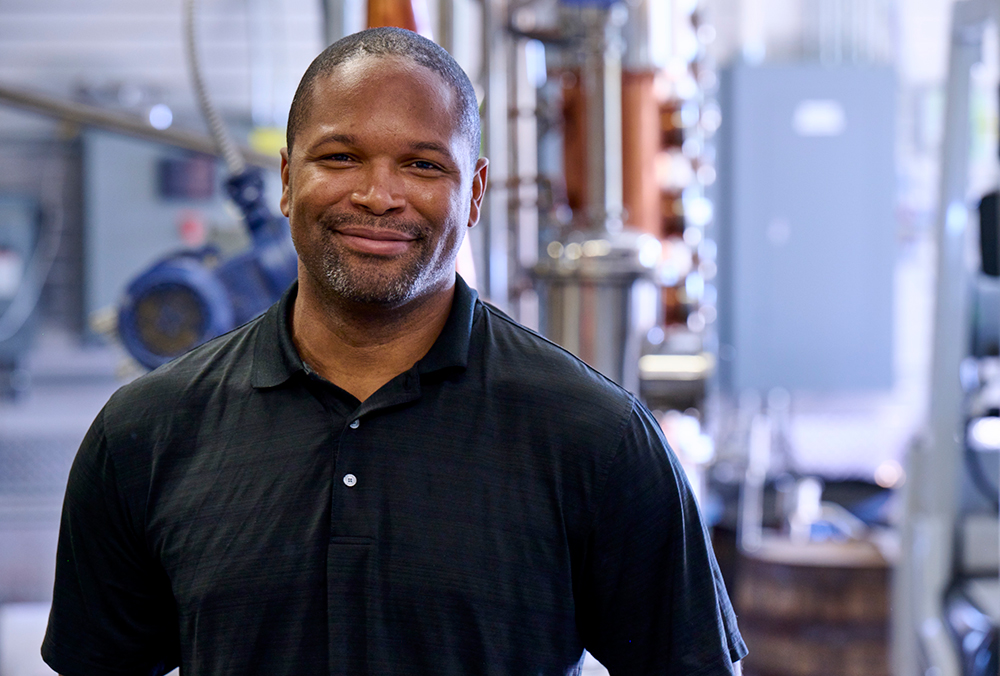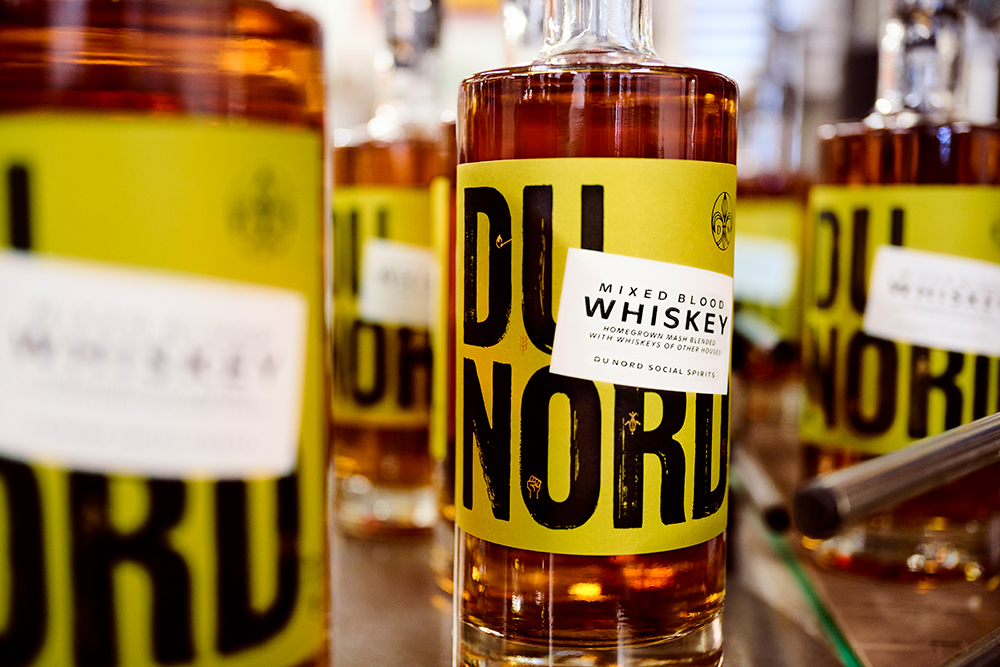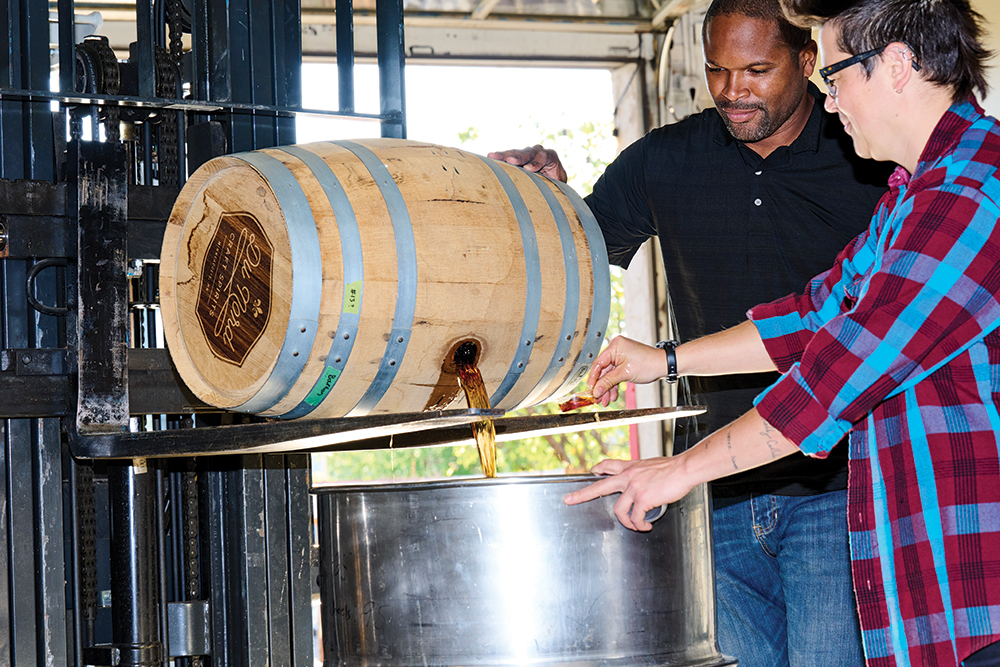Young Spirits: Du Nord Social Spirits
Originally published in the Winter 2022 issue of Bourbon+. Article by Liza Weisstuch.
Chris Montana’s plan to expand Du Nord Social Spirits distillery in Minneapolis was thwarted by the pandemic. But as hand-sanitizer production dominated his schedule, he needed more room. He secured a second space in St. Paul for storage, which would later become a second production site for distilling.
Then, on May 29, events overtook Montana’s plans. George Floyd had been murdered in police custody two miles southwest of his Minneapolis distillery, and the pandemonium that would soon captivate the globe was growing exponentially. The distillery was on fire, as were buildings on many streets around it in all directions. Montana began transporting twenty-six 1,000-gallon totes of spirit from Minneapolis to St. Paul. By the end of the week, he had been tear-gassed more than once and taken a Mission Impossible-caliber route simply to stay safe as riots broke out. His apartment building had suffered a fire, too.
Most distillers did a pivot when the pandemic started. Montana is still swiveling. An exceptional sprinkler system in his distillery prevented the fire from expanding to the point of catastrophe, but water damaged the room that would have housed new distilling space. The Minneapolis building now serves as the Du Nord Foundation Community Market, a food bank, as he sets up the new distillery in St. Paul.

Du Nord is the first Black-owned distillery in the United States to distill its own products. Its story is much like many other small distilleries’ stories—sort of. Montana, who grew up in Minneapolis, had dabbled in home brewing before finishing law school. He knew he wanted to be connected to the beverage-alcohol industry, but with the city’s glut of breweries, beer didn’t seem like a viable option. In 2011, the Surly Bill allowed Minnesota breweries to sell beer on the premises and cut the price of a distillery license from $30,000 to $1,100. Montana and his wife, Shanelle, a co-owner, opened Du Nord in 2013, the year their first child was born. In 2014, a new bill was passed that allowed distilleries to sell their products for on-site consumption. Even better. Indeed, Du Nord is a business, but there are poetic underpinnings.
“It was a way to bridge the city-boy/country-girl thing,” Montana said. Shanelle grew up on a farm, and her father would provide the corn for distilling. But even the deepest love stories come with challenges. When he opened the distillery, Montana said, he’d go to work as “lawyer Chris,” then become “distiller Chris” in the evenings, sometimes even sleeping in the distillery. There’s been a second mortgage and a few gray hairs, but the hard work paid off, and he now runs an entirely family-owned company with nine employees, as well as the food bank, in partnership with Eat for Equity, a national nonprofit that focuses on food insecurity.
In the meantime, he’s outfitting the St. Paul distillery with updated equipment. A new electric still is replacing the steam-boiler one that takes hours to heat. And with 20-foot ceilings, versus the original space’s 10-foot ceilings, there’s lots of room for growth. Meanwhile, in Minneapolis, the 300-gallon still continues to crank out apple and coffee liqueurs, gin, and a high-rye bourbon for Mixed Blood, a blended whiskey. (Once the new distillery is up and running, he intends to move production there and use the original building as an event space.)

Montana served as president of the American Craft Spirits Association (ACSA) from 2018 to 2020, the first person to hold the title for two consecutive terms. In his time, he worked to raise awareness of the lack of diversity in the industry. In August 2021, the ACSA introduced the Spirits Training Entrepreneurship Program for Underrepresented Professionals (STEPUP) Foundation, an initiative to diversify the industry, largely through an internship program. Montana pushed for the program when he was president, but the money wasn’t there. Now it’s in full swing, supported by big and small distilleries and $1.2 million from Diageo.
“Now there’s lots of coming together to diversify the industry,” he said. “If you asked me in 2018 if it would ever be in place, I’d say perhaps in my wildest dreams. I just wanted to get one intern through the program. Now it’s a reflection of the industry as a whole, including the distribution tier, realizing we have a role to play in that.”
He’s also at work on Du Nord Social Spirits, an incubator through the Du Nord Foundation. He devised a model in which any fees that are paid by business in the incubator (rent, etc.) will go back into the foundation to support more businesses’ fees. In other words, all the cash stays within the incubator. He wants to focus on BIPOC entrepreneurs, giving them the opportunity to have entry costs covered. A community kitchen and distillery and brewery equipment will all be available for use.
“People can come in and build brands on our equipment. They’re not going to have to go through nonprofits and grants,” he said. “It’s going to be a way for Black boys and girls to see entrepreneurs and business owners who look like them. The absence of critical mass leads to people like me thinking they can’t run a business.”






